备考2011高效学习方案英语高二册:unit 16 the united states of america
文档属性
| 名称 | 备考2011高效学习方案英语高二册:unit 16 the united states of america |
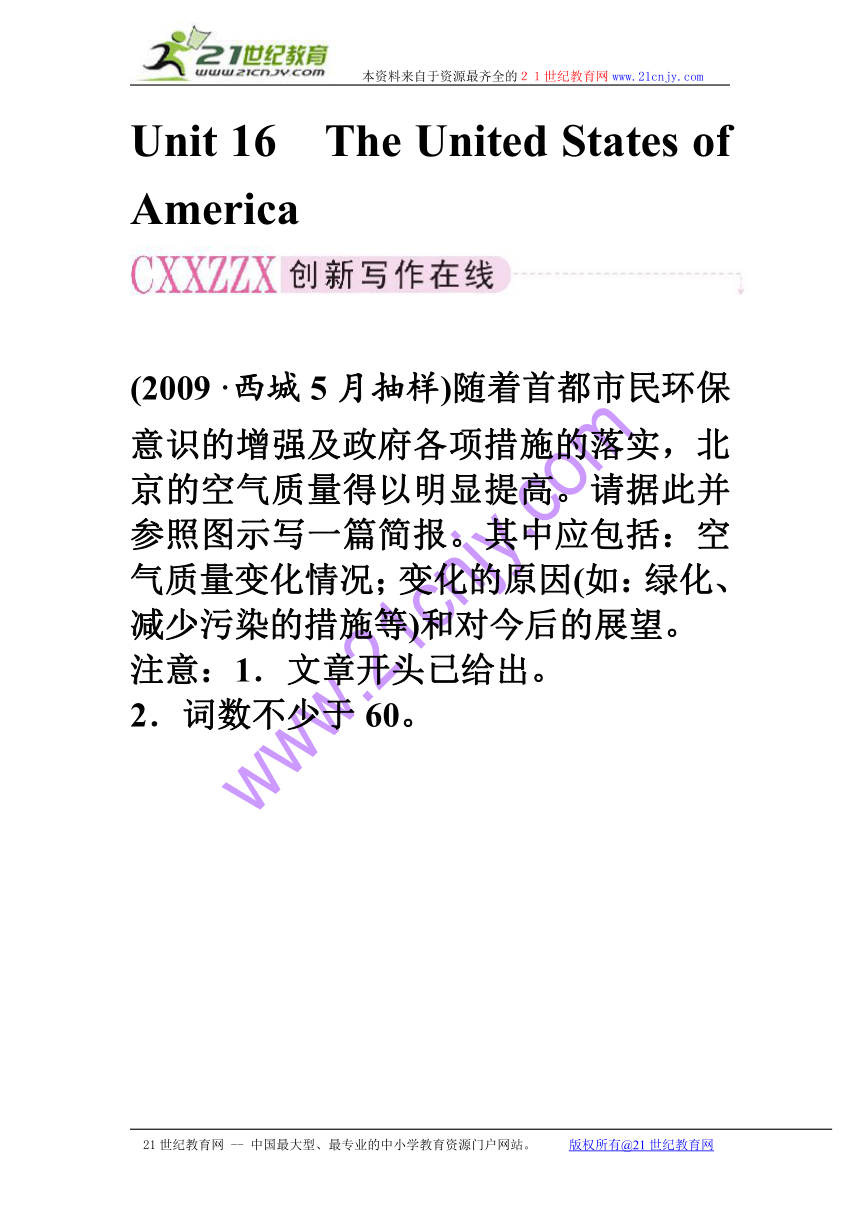
|
|
| 格式 | rar | ||
| 文件大小 | 311.5KB | ||
| 资源类型 | 教案 | ||
| 版本资源 | 人教版 | ||
| 科目 | 英语 | ||
| 更新时间 | 2013-11-24 00:00:00 | ||
图片预览

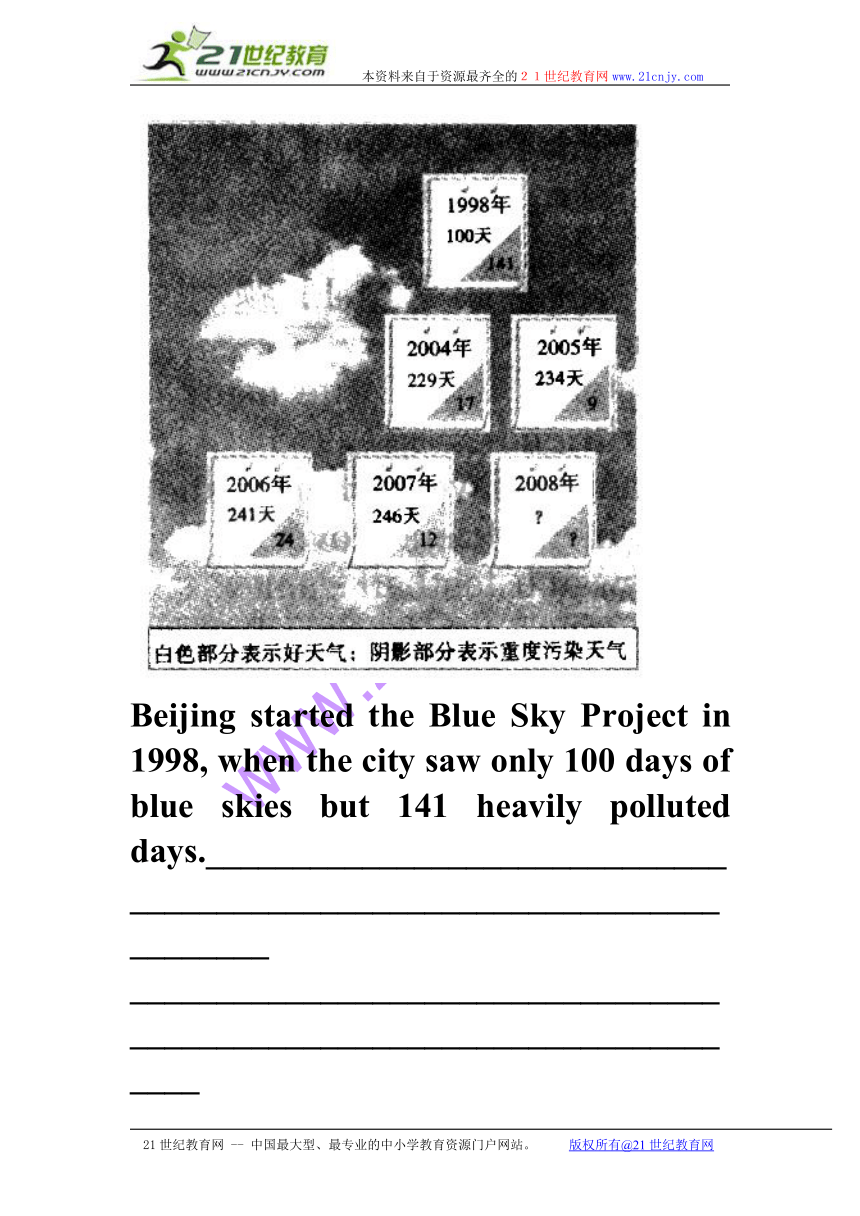
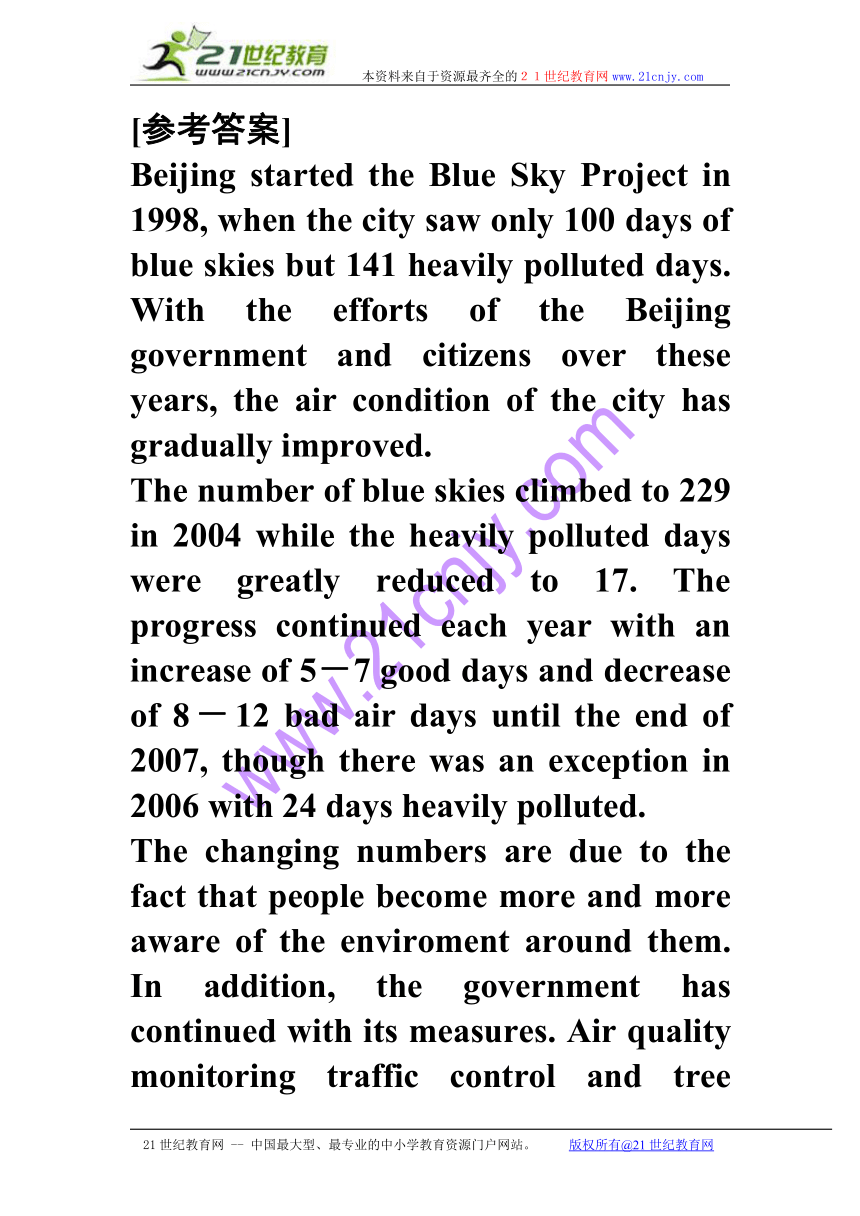
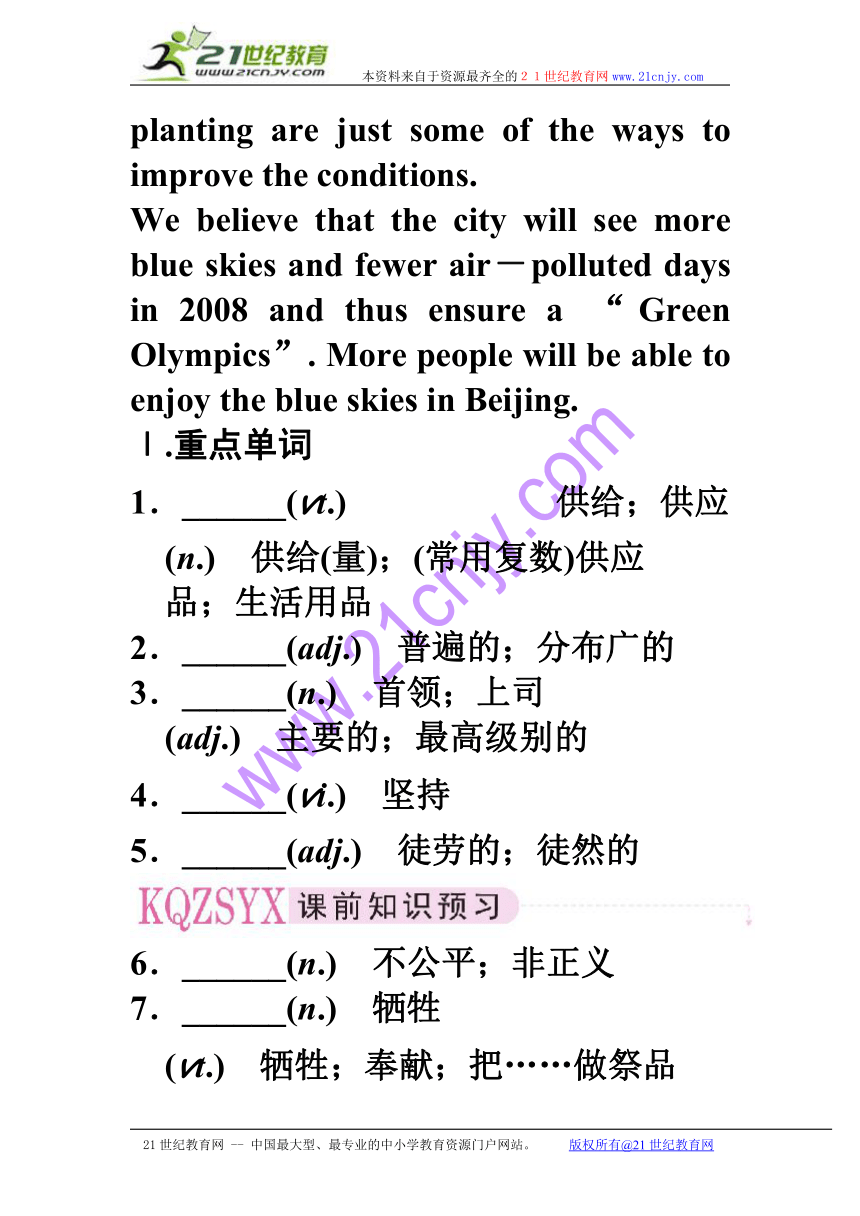
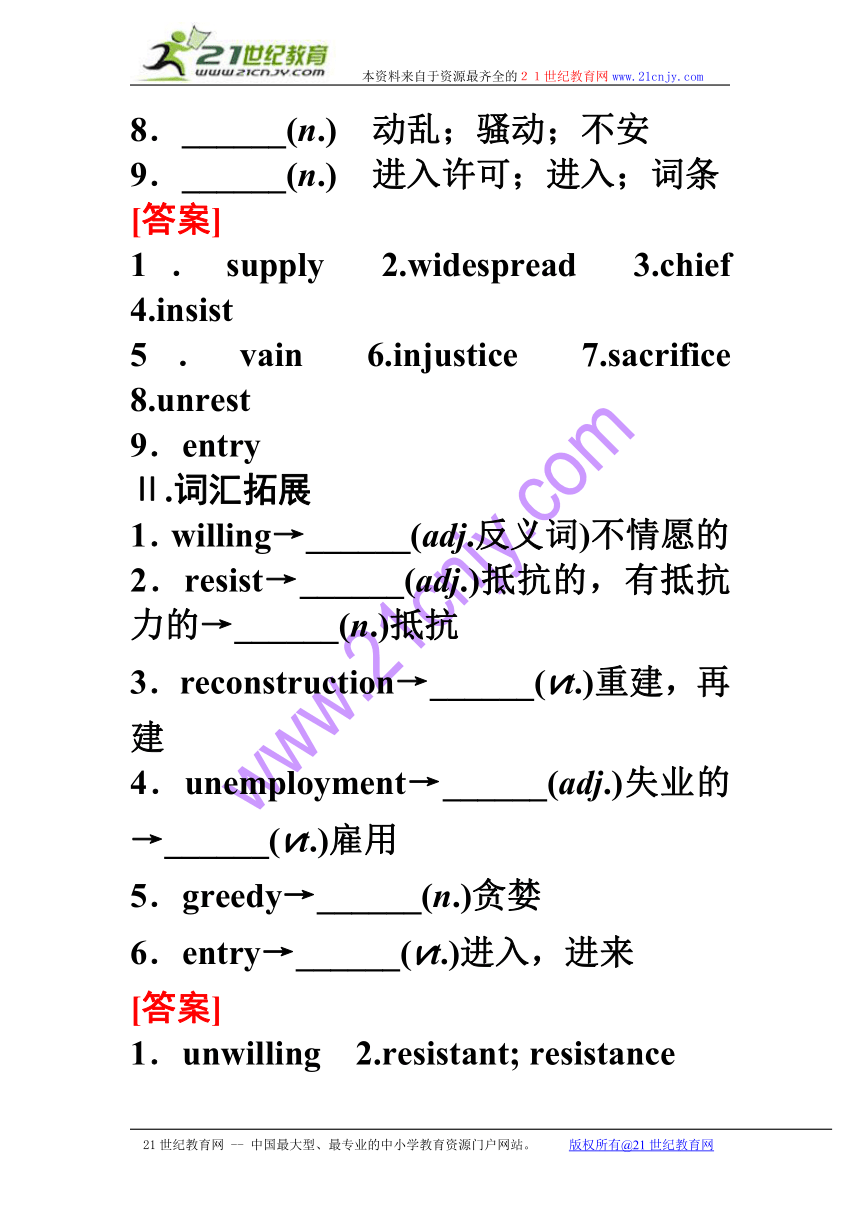
文档简介
本资料来自于资源最齐全的21世纪教育网www.21cnjy.com
Unit 16 The United States of America
(2009·西城5月抽样)随着首都市民环保意识的增强及政府各项措施的落实,北京的空气质量得以明显提高。请据此并参照图示写一篇简报。其中应包括:空气质量变化情况;变化的原因(如:绿化、减少污染的措施等)和对今后的展望。
注意:1.文章开头已给出。
2.词数不少于60。
Beijing started the Blue Sky Project in 1998, when the city saw only 100 days of blue skies but 141 heavily polluted days.________________________________________________________________________
________________________________________________________________________
[参考答案]
Beijing started the Blue Sky Project in 1998, when the city saw only 100 days of blue skies but 141 heavily polluted days. With the efforts of the Beijing government and citizens over these years, the air condition of the city has gradually improved.
The number of blue skies climbed to 229 in 2004 while the heavily polluted days were greatly reduced to 17. The progress continued each year with an increase of 5-7 good days and decrease of 8-12 bad air days until the end of 2007, though there was an exception in 2006 with 24 days heavily polluted.
The changing numbers are due to the fact that people become more and more aware of the enviroment around them. In addition, the government has continued with its measures. Air quality monitoring traffic control and tree planting are just some of the ways to improve the conditions.
We believe that the city will see more blue skies and fewer air-polluted days in 2008 and thus ensure a “Green Olympics”. More people will be able to enjoy the blue skies in Beijing.
Ⅰ.重点单词
1.______(vt.) 供给;供应
(n.) 供给(量);(常用复数)供应
品;生活用品
2.______(adj.) 普遍的;分布广的
3.______(n.) 首领;上司
(adj.) 主要的;最高级别的
4.______(vi.) 坚持
5.______(adj.) 徒劳的;徒然的
6.______(n.) 不公平;非正义
7.______(n.) 牺牲
(vt.) 牺牲;奉献;把……做祭品
8.______(n.) 动乱;骚动;不安
9.______(n.) 进入许可;进入;词条
[答案]
1.supply 2.widespread 3.chief 4.insist
5.vain 6.injustice 7.sacrifice 8.unrest
9.entry
Ⅱ.词汇拓展
1.willing→______(adj.反义词)不情愿的
2.resist→______(adj.)抵抗的,有抵抗力的→______(n.)抵抗
3.reconstruction→______(vt.)重建,再建
4.unemployment→______(adj.)失业的→______(vt.)雇用
5.greedy→______(n.)贪婪
6.entry→______(vt.)进入,进来
[答案]
1.unwilling 2.resistant; resistance
3.reconstruct 4.unemployed; employ
5.greed 6.enter
Ⅲ.重点短语
1.in ______ 转而;反过来;轮流
2.______ sale 出售;减价
3.put ______ 出版;生产;扑灭;关掉
4.______ a result 结果
5.insist ______ 坚持(做)
6.leave ______ 不打扰;不理会
7.leave ______ 留下
8.______ a chance 碰运气;冒险
9.be ______ to do sth. 决心做某事
10.______ vain 徒劳;白辛苦
11.a series ______ 一系列的
12.burn ______ 烧毁
13.drive ______ 驱逐,赶走
[答案]
1.turn 2.on 3.out 4.as 5.on 6.alone
7.behind 8.take 9.determined 10.in
11.of 12.down 13.off
Ⅳ.重点句型
1.While early settlers had killed bison for food, now the killing became more widespread.
尽管早期的移民杀北美野牛是为了获取食物,但现在宰杀变得更为广泛了。
2.Between 1850 and 1910 the bison population is thought to have fallen from 60 million to just a few hundred.
人们认为从1850年到1910年北美野牛的数量已经从六千万头降到仅几百头。
Ⅴ.重点语法
Review Nonfinite Verbs 2(复习非限定动词2)
Ⅰ.词汇聚焦
1.entry [C,U]进入 ,加入;记入(列入)……的条目,项目[C]大门,入口;参加竞赛的人或物
[思维拓展]
entry into进入,加入
make an entry in在……中记录
entry form参赛表格
judge the entries in the children’s painting为儿童绘画比赛的参赛作品做评判
On the ______ of Tom, he found at the ______ of the hall, many people were ______ the ______ examination.
A. entrance; entry, entering; entry
B. entry; entrance; entering for; entrance
C. enter; entering; entry; entry
D. entry; entry; entering into; entry
解析:on the entry of Tom=on Tom’s entry(汤姆一进入);at the entrance指在“入口处”;enter for意为“报名参加”;the entrance examination意为“入学考试”,指“就业,就职”时,用entrance。
答案:B
2.resist v. 抵抗,反抗;抵挡,保持原状;忍住,顶住→n. resistance
[思维拓展]
resist invasion抵抗侵略
resist temptation抵制诱惑
can’t/couldn’t resist doing sth.禁不住干某事
resist disease抵抗疾病
resist doing sth.抵制干某事
①The government are resisting the nurses’ wage demands.
②Lack of proper nourishment reduces their power to resist disease.
Although a teenager, Fred could resist ______ what to do and what not to do.
A. telling B. being told
C. to tell D. to be told
解析:resist后跟动名词,不跟不定式。由题意知:“尽管弗瑞德才十几岁,但他也会反抗别人的颐指气使。”此处应该表被动含义。
答案:B
3.former adj. 以前的(早些时间);(刚提到的两人或两物中)前者,在前的
[思维拓展]
one’s former wife前妻
in former times从前
the former...the latter...前者……后者……
[指点迷津]
former和latter均属于无比较级的形容词,former的副词形式为formerly; latter的副词形式为latterly。
①He made us laugh all the evening; he seemed more like his former self.
②Of the two possibilities, the former seems more likely.
③If offered red or white, I’d like the latter.
Of the two books, I prefer the ______.
A. late B. later
C. latter D. lately
解析:由空格前的the可知,此处应表示名词意义。A项为adj.或adv.;B项为late的比较级,为adv.;C项与the连用可以表示“后者”;lately为adv.。
答案:C
4.leave v.
[思维拓展]
leave sth. for sb.把某物暂时托付给某人
leave sth. to sb.把某物留给某人
=leave sb. sth.(接双宾语)
leave...open让……开着
leave alone不理会,不管
leave...as it is/as they are任其自然
leave sb./sth. doing让……不停地做某事
We have done things we ought not to have done and ______ undone things we ought to have done.
A. left B. leave
C. will leave D. leaving
解析:此处所选动词是与前面we have done并列的谓语,即leave...undone的现在完成时形式。
答案:A
5.chance n. 机会,可能性 vi.碰巧
[思维拓展]
by chance偶然地
get a chance得到一个机会
take a chance冒险、趁机
a chance
chance to do sth.碰巧做某事
[指点迷津]
chance与opportunity
chance侧重于偶然或侥幸得到的机会。
opportunity尤其指符合人们意愿的机缘。如:
Have you got a spare stamp by any chance
你碰巧有多余的邮票吗?
It’s a good opportunity for me to practice speaking English with them.
对于我来讲,这是一个和他们练习英语会话的好机会。
Unluckily, I never had the ______ to hear him play the violin.
A. opportunity B. occasion
C. possibility D. chances
解析:opportunity指“合乎人愿的机会”;occasion指“适宜的时机”;possibility指“可能性”;chance指“偶然的机会”。
答案:A
6.greedy adj. 贪心的,贪婪的;渴望的,一心想要……的
[思维拓展]
with greedy eyes以贪婪的目光
be greedy of gain贪财
be greedy of honour贪慕名誉
be greedy for power/fame渴望权力/名声
be greedy to do sth.急于干某事
be greedy for/after/of渴望干……
be eager to do sth.热心干……,急切干……
be eager for/after/about渴望;渴求
①Don’t be so greedy—leave some of the food for the rest of us.
②The hungry boy looked at the cakes with greedy eyes.
③They were eager to know how wise or foolish their friends and neighbours might be.
Ⅱ.短语突破
1.avoid doing
[思维拓展]
avoid sth.避免某事
avoid doing sth.避免做某事
n. avoidance
[指点迷津]
英语中,非谓语动词作宾语时,通常用动名词作宾语的词(组)有:avoid, admit, delay, practise, risk, enjoy, escape, excuse, finish, forgive, mind, stand, miss, imagine, suggest, devote...to, give up, insist on, look forward to, get down to, put off, stick to, be used to, be worth, feel like等。
用动名词作宾语,和用不定式作宾语补足语的动词有:allow, advise, forbid, permit, consider, suppose等。
①To avoid the city centre, turn right here.
②Nuclear is to be avoided at all costs.
③He tried to avoid answering my questions.
I don’t mind ______ the decision as long as it is not too late.
A. you to delay making
B. your delaying making
C. your delaying to make
D. you delay to make
解析:mind与delay后均不能跟不定式作宾语,故可排除A、C、D。
答案:B
2.tear...into pieces
[思维拓展]
tear...into pieces把……撕成碎片
tear oneself away依依不舍地离开
tear down推倒(尤指建筑物);拆毁
tear up撕毁,撕碎
tear off扯掉
①She tore his letter into little pieces.
②Several trees were torn up in last night’s storm.
③Our roof was torn off by the hurricane.
④He had to tear himself away from the party to prepare for the coming party.
The magician ______ a £5 note and then made it whole again.
A. tore down B. tore off
C. tore into D. tore up
解析:本句含义为“魔术师把一张五英镑钞票撕碎,然后又使钞票恢复原样。”A为“推倒,拆毁”;B为“扯掉”;C为“痛打”;D为“撕碎,撕毁”。
答案:D
3.attend the sick照料病人
[思维拓展]
attend the meeting参加会议
attend the class上课,听课
attend on/upon照料,看护
attend to注意,专心
[指点迷津]
attend, join, join in与take part in
attend指参加会议、上课、上学、听报告等;
join指加入某组织、团体,成为其中的一员;
join in指参加某种活动;表示与某人一起做某事则用join sb. in;
take part in指参加群众性活动、会议,往往指参加并持积极态度,起一定作用。
①Please let us know if you are unable to attend the conference.
②The queen had a good doctor attending on her.
③Excuse me, but I have an urgent matter to attend to.
—Would you like to ______ us in celebrating John’s return from Africa tonight
—I’d like to, but I have to ______ a meeting.
A. join; attend
B. attend; join
C. take part in; attend
D. join; join in
解析:join us in celebrating John’s return“和我们一起庆贺约翰的归来”;attend a meeting“参加会议”。
答案:A
4.put out使熄灭;发行,出版;使恼怒,使心烦意乱
[思维拓展]
put on穿上,戴上;演出;增加,提高
put one’s mind to把心思用在……上
put aside储存;备用;把……撇开不理
put away把……收起来
put back拖延,延误;把(钟表)拨慢
put down镇压,控制;写下,记下;使……着陆
put forward提出,建议
put off推迟,使延期
put up盖起,搭起;张贴;增加
The forest guards often find campfires that have not been ______ completely.
A. put away B. put out
C. turned down D. turned over
解析:A“收拾,整理”;B“扑灭”;C“拒绝,关小”;D“翻转”。野营的火只能用扑灭。
答案:B
5.shoot...to death击毙某人
[思维拓展]
①beat sb. to death打死某人
sentence sb. to death判处某人死刑
put sb. to death处死某人
shoot sb. to death击毙某人
frighten sb. to death吓死某人
②work to death累死
starve to death饿死
fight to death战斗到底
be burned to death烧死
be frozen to death冻死
be tired to death极度疲劳
be sick to death病危
Hundreds of animals were burned ______ in the forest fire, only a few escaping death.
A. at death B. in death
C. by death D. to death
解析:由题干中only a few escaping death可知“许多动物在森林大火中被烧死”。此处应为burn sb./sth. to death。
答案:D
6.in honour of为纪念……;出于对……的敬意
[思维拓展]
in honour of sb./sth.=in sb.’s/sth.’s honour
出于对某人/物的尊敬
with honour for为……争光
show honour to sb.向某人表示敬意
have honour 很荣幸地做某事
on one’s honour用名誉担保
pay/give honour to向……致敬
honour sb./sth. with向某人/物致敬;给某人荣誉
[指点迷津]
honour除了作为抽象名词使用,表示“荣誉,敬意,崇敬,气节,名誉”等外,还可以用作单数,此时可以与不定冠词连用。如:
He’s an honour to the school.他是学校的光荣。
On their arrival, they found the people suffering the quake were ______ food and water supplies.
A. in praise of B. in honour of
C. in face of D. in want of
解析:考查介词短语。题意为:受地震灾害的人们缺乏食品和饮水供应。in want of“缺乏”;in praise of“表扬”;in honour of“纪念”;in face of“面临”。
答案:D
Ⅲ.句型归纳
1.While early settlers had killed bison for food, now the killing became more widespread.尽管早期的移民杀北美野牛是为了获取食物,而现在宰杀变得更为广泛了。
while在该句中作连词使用,表示“尽管”。又如:
While I understand what you say, I can’t agree with you.尽管我明白你所说的,但我不同意你。
while作连词,还可以表示“当……时候,和……同时”;以及“但是,却”之意。如:
They arrived while we were having dinner.我们正吃饭时,他们来了。
Their country has plenty of oil, while ours has none.他们国家有很多石油,而我们国家则没有。
______ I accept that he is not perfect. I do actually like the person.
A. While B. Since
C. Before D. Unless
解析:本题题意为“尽管我承认他并不完美,但我真的喜欢他。”四个选项中只有while可以表示“尽管”。
答案:A
2.The food doesn’t taste good.食物尝起来不怎么样。
上句中的taste为连系动词,其后用形容词或过去分词作表语。英语中另外还有keep, stand, smell, sound, stay, feel, look等词作连系动词使用。
[思维拓展]
表感觉的系动词:feel, sound, smell, look
表状态的系动词:be, seem, appear
表变化的系动词:get, grow, turn, become, go, come, fall
表保持状态的系动词:keep, stay, remain, prove
[注]
(1)系动词无被动语态
(2)系动词不能用于进行时态
This kind of apple must sell ______, for it tastes ______ and smells ______.
A. good; good; good
B. well; nice; well
C. well; good; nice
D. nice; well; good
解析:sell well为固定短语,意为“畅销”,taste、smell此处都是系动词,其后面只能用形容词作表语。good和nice都是形容词。well既是副词又是形容词,但作副词是“好”的意思,作形容词用时,则是“健康”的意思。
答案:C
21世纪教育网 -- 中国最大型、最专业的中小学教育资源门户网站。 版权所有@21世纪教育网
Unit 16 The United States of America
(2009·西城5月抽样)随着首都市民环保意识的增强及政府各项措施的落实,北京的空气质量得以明显提高。请据此并参照图示写一篇简报。其中应包括:空气质量变化情况;变化的原因(如:绿化、减少污染的措施等)和对今后的展望。
注意:1.文章开头已给出。
2.词数不少于60。
Beijing started the Blue Sky Project in 1998, when the city saw only 100 days of blue skies but 141 heavily polluted days.________________________________________________________________________
________________________________________________________________________
[参考答案]
Beijing started the Blue Sky Project in 1998, when the city saw only 100 days of blue skies but 141 heavily polluted days. With the efforts of the Beijing government and citizens over these years, the air condition of the city has gradually improved.
The number of blue skies climbed to 229 in 2004 while the heavily polluted days were greatly reduced to 17. The progress continued each year with an increase of 5-7 good days and decrease of 8-12 bad air days until the end of 2007, though there was an exception in 2006 with 24 days heavily polluted.
The changing numbers are due to the fact that people become more and more aware of the enviroment around them. In addition, the government has continued with its measures. Air quality monitoring traffic control and tree planting are just some of the ways to improve the conditions.
We believe that the city will see more blue skies and fewer air-polluted days in 2008 and thus ensure a “Green Olympics”. More people will be able to enjoy the blue skies in Beijing.
Ⅰ.重点单词
1.______(vt.) 供给;供应
(n.) 供给(量);(常用复数)供应
品;生活用品
2.______(adj.) 普遍的;分布广的
3.______(n.) 首领;上司
(adj.) 主要的;最高级别的
4.______(vi.) 坚持
5.______(adj.) 徒劳的;徒然的
6.______(n.) 不公平;非正义
7.______(n.) 牺牲
(vt.) 牺牲;奉献;把……做祭品
8.______(n.) 动乱;骚动;不安
9.______(n.) 进入许可;进入;词条
[答案]
1.supply 2.widespread 3.chief 4.insist
5.vain 6.injustice 7.sacrifice 8.unrest
9.entry
Ⅱ.词汇拓展
1.willing→______(adj.反义词)不情愿的
2.resist→______(adj.)抵抗的,有抵抗力的→______(n.)抵抗
3.reconstruction→______(vt.)重建,再建
4.unemployment→______(adj.)失业的→______(vt.)雇用
5.greedy→______(n.)贪婪
6.entry→______(vt.)进入,进来
[答案]
1.unwilling 2.resistant; resistance
3.reconstruct 4.unemployed; employ
5.greed 6.enter
Ⅲ.重点短语
1.in ______ 转而;反过来;轮流
2.______ sale 出售;减价
3.put ______ 出版;生产;扑灭;关掉
4.______ a result 结果
5.insist ______ 坚持(做)
6.leave ______ 不打扰;不理会
7.leave ______ 留下
8.______ a chance 碰运气;冒险
9.be ______ to do sth. 决心做某事
10.______ vain 徒劳;白辛苦
11.a series ______ 一系列的
12.burn ______ 烧毁
13.drive ______ 驱逐,赶走
[答案]
1.turn 2.on 3.out 4.as 5.on 6.alone
7.behind 8.take 9.determined 10.in
11.of 12.down 13.off
Ⅳ.重点句型
1.While early settlers had killed bison for food, now the killing became more widespread.
尽管早期的移民杀北美野牛是为了获取食物,但现在宰杀变得更为广泛了。
2.Between 1850 and 1910 the bison population is thought to have fallen from 60 million to just a few hundred.
人们认为从1850年到1910年北美野牛的数量已经从六千万头降到仅几百头。
Ⅴ.重点语法
Review Nonfinite Verbs 2(复习非限定动词2)
Ⅰ.词汇聚焦
1.entry [C,U]进入 ,加入;记入(列入)……的条目,项目[C]大门,入口;参加竞赛的人或物
[思维拓展]
entry into进入,加入
make an entry in在……中记录
entry form参赛表格
judge the entries in the children’s painting为儿童绘画比赛的参赛作品做评判
On the ______ of Tom, he found at the ______ of the hall, many people were ______ the ______ examination.
A. entrance; entry, entering; entry
B. entry; entrance; entering for; entrance
C. enter; entering; entry; entry
D. entry; entry; entering into; entry
解析:on the entry of Tom=on Tom’s entry(汤姆一进入);at the entrance指在“入口处”;enter for意为“报名参加”;the entrance examination意为“入学考试”,指“就业,就职”时,用entrance。
答案:B
2.resist v. 抵抗,反抗;抵挡,保持原状;忍住,顶住→n. resistance
[思维拓展]
resist invasion抵抗侵略
resist temptation抵制诱惑
can’t/couldn’t resist doing sth.禁不住干某事
resist disease抵抗疾病
resist doing sth.抵制干某事
①The government are resisting the nurses’ wage demands.
②Lack of proper nourishment reduces their power to resist disease.
Although a teenager, Fred could resist ______ what to do and what not to do.
A. telling B. being told
C. to tell D. to be told
解析:resist后跟动名词,不跟不定式。由题意知:“尽管弗瑞德才十几岁,但他也会反抗别人的颐指气使。”此处应该表被动含义。
答案:B
3.former adj. 以前的(早些时间);(刚提到的两人或两物中)前者,在前的
[思维拓展]
one’s former wife前妻
in former times从前
the former...the latter...前者……后者……
[指点迷津]
former和latter均属于无比较级的形容词,former的副词形式为formerly; latter的副词形式为latterly。
①He made us laugh all the evening; he seemed more like his former self.
②Of the two possibilities, the former seems more likely.
③If offered red or white, I’d like the latter.
Of the two books, I prefer the ______.
A. late B. later
C. latter D. lately
解析:由空格前的the可知,此处应表示名词意义。A项为adj.或adv.;B项为late的比较级,为adv.;C项与the连用可以表示“后者”;lately为adv.。
答案:C
4.leave v.
[思维拓展]
leave sth. for sb.把某物暂时托付给某人
leave sth. to sb.把某物留给某人
=leave sb. sth.(接双宾语)
leave...open让……开着
leave alone不理会,不管
leave...as it is/as they are任其自然
leave sb./sth. doing让……不停地做某事
We have done things we ought not to have done and ______ undone things we ought to have done.
A. left B. leave
C. will leave D. leaving
解析:此处所选动词是与前面we have done并列的谓语,即leave...undone的现在完成时形式。
答案:A
5.chance n. 机会,可能性 vi.碰巧
[思维拓展]
by chance偶然地
get a chance得到一个机会
take a chance冒险、趁机
a chance
chance to do sth.碰巧做某事
[指点迷津]
chance与opportunity
chance侧重于偶然或侥幸得到的机会。
opportunity尤其指符合人们意愿的机缘。如:
Have you got a spare stamp by any chance
你碰巧有多余的邮票吗?
It’s a good opportunity for me to practice speaking English with them.
对于我来讲,这是一个和他们练习英语会话的好机会。
Unluckily, I never had the ______ to hear him play the violin.
A. opportunity B. occasion
C. possibility D. chances
解析:opportunity指“合乎人愿的机会”;occasion指“适宜的时机”;possibility指“可能性”;chance指“偶然的机会”。
答案:A
6.greedy adj. 贪心的,贪婪的;渴望的,一心想要……的
[思维拓展]
with greedy eyes以贪婪的目光
be greedy of gain贪财
be greedy of honour贪慕名誉
be greedy for power/fame渴望权力/名声
be greedy to do sth.急于干某事
be greedy for/after/of渴望干……
be eager to do sth.热心干……,急切干……
be eager for/after/about渴望;渴求
①Don’t be so greedy—leave some of the food for the rest of us.
②The hungry boy looked at the cakes with greedy eyes.
③They were eager to know how wise or foolish their friends and neighbours might be.
Ⅱ.短语突破
1.avoid doing
[思维拓展]
avoid sth.避免某事
avoid doing sth.避免做某事
n. avoidance
[指点迷津]
英语中,非谓语动词作宾语时,通常用动名词作宾语的词(组)有:avoid, admit, delay, practise, risk, enjoy, escape, excuse, finish, forgive, mind, stand, miss, imagine, suggest, devote...to, give up, insist on, look forward to, get down to, put off, stick to, be used to, be worth, feel like等。
用动名词作宾语,和用不定式作宾语补足语的动词有:allow, advise, forbid, permit, consider, suppose等。
①To avoid the city centre, turn right here.
②Nuclear is to be avoided at all costs.
③He tried to avoid answering my questions.
I don’t mind ______ the decision as long as it is not too late.
A. you to delay making
B. your delaying making
C. your delaying to make
D. you delay to make
解析:mind与delay后均不能跟不定式作宾语,故可排除A、C、D。
答案:B
2.tear...into pieces
[思维拓展]
tear...into pieces把……撕成碎片
tear oneself away依依不舍地离开
tear down推倒(尤指建筑物);拆毁
tear up撕毁,撕碎
tear off扯掉
①She tore his letter into little pieces.
②Several trees were torn up in last night’s storm.
③Our roof was torn off by the hurricane.
④He had to tear himself away from the party to prepare for the coming party.
The magician ______ a £5 note and then made it whole again.
A. tore down B. tore off
C. tore into D. tore up
解析:本句含义为“魔术师把一张五英镑钞票撕碎,然后又使钞票恢复原样。”A为“推倒,拆毁”;B为“扯掉”;C为“痛打”;D为“撕碎,撕毁”。
答案:D
3.attend the sick照料病人
[思维拓展]
attend the meeting参加会议
attend the class上课,听课
attend on/upon照料,看护
attend to注意,专心
[指点迷津]
attend, join, join in与take part in
attend指参加会议、上课、上学、听报告等;
join指加入某组织、团体,成为其中的一员;
join in指参加某种活动;表示与某人一起做某事则用join sb. in;
take part in指参加群众性活动、会议,往往指参加并持积极态度,起一定作用。
①Please let us know if you are unable to attend the conference.
②The queen had a good doctor attending on her.
③Excuse me, but I have an urgent matter to attend to.
—Would you like to ______ us in celebrating John’s return from Africa tonight
—I’d like to, but I have to ______ a meeting.
A. join; attend
B. attend; join
C. take part in; attend
D. join; join in
解析:join us in celebrating John’s return“和我们一起庆贺约翰的归来”;attend a meeting“参加会议”。
答案:A
4.put out使熄灭;发行,出版;使恼怒,使心烦意乱
[思维拓展]
put on穿上,戴上;演出;增加,提高
put one’s mind to把心思用在……上
put aside储存;备用;把……撇开不理
put away把……收起来
put back拖延,延误;把(钟表)拨慢
put down镇压,控制;写下,记下;使……着陆
put forward提出,建议
put off推迟,使延期
put up盖起,搭起;张贴;增加
The forest guards often find campfires that have not been ______ completely.
A. put away B. put out
C. turned down D. turned over
解析:A“收拾,整理”;B“扑灭”;C“拒绝,关小”;D“翻转”。野营的火只能用扑灭。
答案:B
5.shoot...to death击毙某人
[思维拓展]
①beat sb. to death打死某人
sentence sb. to death判处某人死刑
put sb. to death处死某人
shoot sb. to death击毙某人
frighten sb. to death吓死某人
②work to death累死
starve to death饿死
fight to death战斗到底
be burned to death烧死
be frozen to death冻死
be tired to death极度疲劳
be sick to death病危
Hundreds of animals were burned ______ in the forest fire, only a few escaping death.
A. at death B. in death
C. by death D. to death
解析:由题干中only a few escaping death可知“许多动物在森林大火中被烧死”。此处应为burn sb./sth. to death。
答案:D
6.in honour of为纪念……;出于对……的敬意
[思维拓展]
in honour of sb./sth.=in sb.’s/sth.’s honour
出于对某人/物的尊敬
with honour for为……争光
show honour to sb.向某人表示敬意
have honour 很荣幸地做某事
on one’s honour用名誉担保
pay/give honour to向……致敬
honour sb./sth. with向某人/物致敬;给某人荣誉
[指点迷津]
honour除了作为抽象名词使用,表示“荣誉,敬意,崇敬,气节,名誉”等外,还可以用作单数,此时可以与不定冠词连用。如:
He’s an honour to the school.他是学校的光荣。
On their arrival, they found the people suffering the quake were ______ food and water supplies.
A. in praise of B. in honour of
C. in face of D. in want of
解析:考查介词短语。题意为:受地震灾害的人们缺乏食品和饮水供应。in want of“缺乏”;in praise of“表扬”;in honour of“纪念”;in face of“面临”。
答案:D
Ⅲ.句型归纳
1.While early settlers had killed bison for food, now the killing became more widespread.尽管早期的移民杀北美野牛是为了获取食物,而现在宰杀变得更为广泛了。
while在该句中作连词使用,表示“尽管”。又如:
While I understand what you say, I can’t agree with you.尽管我明白你所说的,但我不同意你。
while作连词,还可以表示“当……时候,和……同时”;以及“但是,却”之意。如:
They arrived while we were having dinner.我们正吃饭时,他们来了。
Their country has plenty of oil, while ours has none.他们国家有很多石油,而我们国家则没有。
______ I accept that he is not perfect. I do actually like the person.
A. While B. Since
C. Before D. Unless
解析:本题题意为“尽管我承认他并不完美,但我真的喜欢他。”四个选项中只有while可以表示“尽管”。
答案:A
2.The food doesn’t taste good.食物尝起来不怎么样。
上句中的taste为连系动词,其后用形容词或过去分词作表语。英语中另外还有keep, stand, smell, sound, stay, feel, look等词作连系动词使用。
[思维拓展]
表感觉的系动词:feel, sound, smell, look
表状态的系动词:be, seem, appear
表变化的系动词:get, grow, turn, become, go, come, fall
表保持状态的系动词:keep, stay, remain, prove
[注]
(1)系动词无被动语态
(2)系动词不能用于进行时态
This kind of apple must sell ______, for it tastes ______ and smells ______.
A. good; good; good
B. well; nice; well
C. well; good; nice
D. nice; well; good
解析:sell well为固定短语,意为“畅销”,taste、smell此处都是系动词,其后面只能用形容词作表语。good和nice都是形容词。well既是副词又是形容词,但作副词是“好”的意思,作形容词用时,则是“健康”的意思。
答案:C
21世纪教育网 -- 中国最大型、最专业的中小学教育资源门户网站。 版权所有@21世纪教育网
同课章节目录
